大学英语精读unit2 sailing round the world
大学英语精读第一册 Exercise of Unit Two
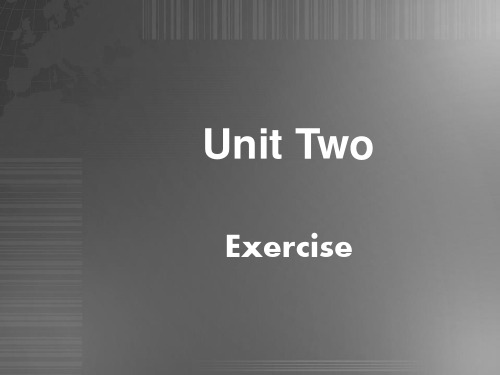
14) Payment(付款) may be made in any of the _following__ ways: by cash (现金), by cheque, or by credit card. 可以通过下列任何一种方式付款:现金、支票或信用卡。 15) _In spite of_ all the efforts they did not succeed. 尽管付出了所有的努力,他们还是没能成功。
8) He is a man of great ability. I am sure that a lot will be _accomplished_ if he is elected chairman of the student union. 他是一个很有能力的人。我相信如果他当选学生会主席,很 多事都会做好。 9. Jack arrived an hour late for the meeting. __Moreover_, he didn’t even apologized or give an explanation. 杰克会议迟到了一个小时。不仅如此,他竟然没有道歉或者 作出解释。 10. He says you are _undoubtedly__ the best candidate(候选 人). 他说你无疑是最佳的候选人。
5) I recognized him as a friend of my father’s whom I _had previously met_ once or twice. (previously) 我认出他是我父亲的一个朋友,我以前曾见过他一两次。 6) Of all American cities, San Francisco is considered by many to be _by far the most_ beautiful. (by far) 在所有的美国城市中,圣弗朗西斯科被很多人认为是最 漂亮的。
上外版大学英语第一册UNIT2-单词讲解(修订版)

by Yu Shuli
The title “Sailing Round the World” means “travelling round the earth by ship,” i.e. 环球航行
Pre-reading
Comprehension of the text (answer the questions on page 31)
Background Knowledge
封爵:
骑士是中世纪流传下来的封号,意即“战斗中最 勇敢的人”。由于骑士战功卓著,从而跻身于贵 族行列。 现今的爵士是荣誉称号,是用来奖励那些在科技、 文化、体育等方面为国家做出重大贡献的人。 封爵仪式一般过程是,被册封的人单膝跪在国王 或王后的面前,国王或王后用手中的剑依次接触 他的左右肩和头,然后宣布册封他为爵士,从此 他在正式场合使用的名字前面要加上“Sir”。
Chichester's Course
set off from ___,sailing across __,and turing around __into the Indian Ocean. arrived in__,with the first half of his voyage completed. after a rest, he set sail again from__on the second passage of his voyage via__.He arrived back in__. It took him __ to complete the__voyage singlehandedly.
retire:give up one's job because of old age -Professors usually retire at 60 in China. -Next year I will retire from the school. retirement:n
大学英语精读 第三版第一册Unit 2 Sailing Round the World

Sailing
■
Before Reading
Global Reading
Detailed Reading
After Reading
Questions about the Song 1. What is the film about? 2. What do you think of sailing on the sea? 3. What can we learn from the people in the film?
* Zheng He * Sir Francis Drake
* Elizabeth II * Elizabeth I Knight , Knighthood & Knighthood Ceremony
Before Reading
Global Reading
Detailed Reading
After Reading
■
Before Reading
Global Reading
Global Reading
Detailed Reading
After Reading
Achievements: In 1966-1967, he sailed around the world alone in a 55-foot sailing yacht, the longest passage made by a small sailing vessel without a port of call.
Tasman sea
In 1960, he won the first solo transatlantic ocean race sailing from Plymouth, England to New York City in 40 days.
大学英语精读第一册UnitTwo:SailingRoundtheWorld

★英语听⼒频道为⼤家整理的⼤学英语精读第⼀册 Unit Two: Sailing Round the World。
更多阅读请查看本站频道。
TEXTAt sixty-five Francis Chichester set out to sail single-handed round the world. This is the story of that adventure.Sailing Round the WorldBefore he sailed round the world single-handed, Francis Chichester had already surprised his friends several times. He had tried to fly round the world but failed. That was in 1931.The years passed. He gave up flying and began sailing. He enjoyed it greatly. Chichester was already 58 years old when he won the first solo transatlantic sailing race. His old dream of going round the world came back, but this time he would sail. His friends and doctors did not think he could do it, as he had lung cancer. But Chichester was determined to carry out his plan. In August, 1963, at the age of nearly sixty-five, an age when many men retire, he began the greatest voyage of his life. Soon, he was away in this new 16-metre boat, Gipsy Moth.Chichester followed the route of the great nineteenth century clipper ships. But the clippers had had plenty of crew. Chicheater did it all by himself, even after the main steering device had been damaged by gales. Chichester covered 14, 100 miles before stopping in Sydney, Australia. This was more than twice the distance anyone had previously sailed alone.He arrived in Australia on 12 December, just 107 days out from England. He received a warm welcome from the Australians and from his family who had flown there to meet him. On shore, Chichester could not walk without help. Everybody said the same thing: he had done enough; he must not go any further. But he did not listen.After resting in Sydney for a few weeks, Chichester set off once more in spite of his friends' attempts to dissuade him. The second half of his voyage was by far the more dangerous part, during which he sailed round the treacherous Cape Horn.On 29 January he left Australia. The mext night, the blackest he had ever known, the sea became so rough that the boat almost turned over. Food, clothes, and broken glass were all mixed together. Fortunately, bed and went to sleep. When he woke up, the sea had become calm the nearest person he could contact by radio, unless there was a ship nearby, Wild be on an island 885 miles away.After succeeding in sailing round Cape Horn, Chichester sent the followiing radio message to London:" I feel as if I had wakened from a nightmare. Wild horses could not drag me down to Cape Horn and that sinister Southern Ocean again." Juat before 9 o'clock on Sunday evening 28 May, 1967, he aeeived back in England, where a quarter of a million people were waiting to welcome him. Queeh Elizabeth II knigthed him with the very sword that Queen Elizabeth I had sailed round the world for the first time. The whole voyage from England and back had covered 28, 500 miles. It had taken him nine months , of which the sailing time was 226 days. He had done what he wanted to accomplish.Like many other adventurers, Chichester had experienced fear and conquered it. In doing so, he had undoubtedly learnt something about himself. Moreover, in the modern age when human beings depend so much on machines, he had given men throughout the world new pride.NEW WORDSsingle-handeda & ad. (done) by one person alone 单独的(地)adventuren. 冒险(活动)soloa. single-handed 单独的transatlantica. crossing the Atlantic Ocean 横度⼤西洋lungn. part of the body with which one breathes 肺cancern. 癌determineda. with one's mind firmly made up 下定了决⼼的determinev.determinationn.retirevi. stop working at one's job(because of age) 退休voyagen. sea journey 航海;航⾏routen. way from one place to another 路线clippern. 快速帆船crewn. group of people who work together on a ship or aeroplane 全体船员;全体乘务员steervt. make (esp. a boat or road vehicle) go in a particular direction 为...撑舵devicen. a piece of equipment 设备;装置steering device n. 操舵装置damagevt. cause harm or injury to 损坏ad. harm, injury 损坏galen. very strong wind ⼤风covervt. travel (a certain distance) ⾏过(⼀段距离)previouslyad. before 以前previous a.attemptn. try 试图,尝试dissuadevt. prevent (sb.) from doing sth. by reasoning 劝阻treacherousa. more dangerous than it seems 暗藏危险的;*诈的capen. 海⾓rougha. (of weather or the sea) stormy; not calm (⽓候)有暴风⾬的;(海)波涛汹涌的fortunatelyad. luckily 幸运地;幸亏fortunatea.contactvt. get in touch with 联系,接触nearbyad. close by 在附近followinga. next; to be mentioned immediately 接着的;下列的wakenv. (cause to) wake 唤醒;醒来nightmaren. terrible dream 恶梦dragvt. pull along with great effort 拖,拉sinistera. 凶恶的,邪恶的knightn. 爵⼠vt. 封... 为爵⼠sword n. 剑,⼑accomplishvt. finish successfully 完成conquervt. overcome 征服undoubtedlyad. certainly ⽆疑地moreoverad. in addition 此外,⽽且humana. of or concerning people ⼈们beingn. a living thing, esp. a person ⽣物;⼈PHRASES & EXPRESSIOMSset outbegin a course if action 着⼿,开始give upatop doing 放弃be determined to (do)have a strong will to (do) 决⼼(做)(all) by oneself(completely) alone in spite ofnot taking notice of; not caring about 尽管;虽然by farby a large amount or degree...得多turn over(cause to) fall over, upset (使)翻倒,(使)倾覆can not helpcan not keep oneself from 禁不住PEOPER NAMESFrancis Chichester 弗朗西斯. 奇切斯特Gipsy Moth 吉普赛. 莫斯Sydney悉尼(澳⼤利亚城市)Cape Horn合恩⾓(智利)London伦敦Elizabeth伊丽莎⽩(⼥⼦名)Drake德雷克(姓⽒)。
Unit_2_Sailing_Round_the_World__课件
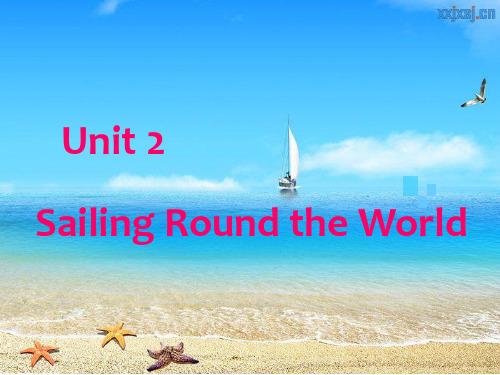
Knights The highest class of fighting men in Europe during the
Middle Ages.
Knighthood Ceremony The king or Queen takes the sword of the person being honored or borrows one from someone present at the ceremony. The person about to be knighted kneels on one knee and bows his head respectfully in front of the King or Queen. The King or Queen touches with the sword first the left shoulder of the person bowing before him or her then the right shoulder and finally the top of the bowed head. While doing this the King or Queen says "We dub thee Sir_______."
In 1966-1967, he sailed around the world alone in a 53- foot sailing
yacht 快艇.
In 1967, he was knighted by Queen Elizabeth II.
Elizabeth II (1926– ) — Queen of Great Britain and Northern Ireland
Unit-2 Sailing Round the World 练习及答案教材

2. Fill in the blanks.
11. In those days the Portuguese (葡萄牙人) were trying to reach India by sailing round Africa, but Columbus __w_a_s_d_e_t_e_rm__in_e_d__ to prove that India could be reached by sailing west. 在那时候,葡萄牙人一直试图绕过非洲到达印度,但 哥伦布决心证明可以通过向西航行到达印度。
7)The whole journey was a _n_ig_h_t_m_a_r_e_; we lost our luggage and we arrived two days late. 这个旅程就是一个噩梦:我们丢了行李还迟到了 两天。
Handan College
2. Fill in the blanks.
2) Tom invented(发明) a _d_e_v_ic_e_ to make the door shut by itself. 汤姆发明了一个装置让门自己关闭。
3) I’ll c_o_n_t_a_c_t you by telephone when I hear anything new. 当我听到任何新闻,我将通过电话联系你。
9. Jack arrived an hour late for the meeting. _M_o_r_e_o_v_e_r, he didn’t even apologized or give an explanation. 杰克会议迟到了一个小时。不仅如此,他竟然没有道 歉或者作出解释。
10. He says you are _u_n_d_o_u_b_te_d_l_y_ the best candidate. 他说你无疑是最佳的候选人。
大学英语精读第三版答案
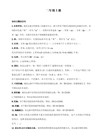
3. He is determined to continue his experiment but this time he'll do it another way.
5. Having been operated on twice for the disease, she was so weakened that she could barely stand up.
6. Educators think that the generation growing up with television spent so much of their time in front of the TV that they do not have enough time to study.
2. With this letter I enclose some illustrations for the story.
3. The ancient building was enclosed by a high wall.
4. Dr. Green is busy working on a cure of AIDS, but from next month on he'll be able to fit in twenty patients or so on Monday morning.
3. My grandparents said that the man who invented television had once lived in their neighborhood.
外教社大学英语精读1、2册课后翻译答案

外教社大学英语精读1、2册课后翻译答案第一册1:他这次考试失败使他意识到定期复习功课是多么重要。
He failed in the exam, which has made him realize the importance of reviewing his lessons regularly.2:请一定不要忘记离家前你父母对你说过的话。
Be sure not to forget what your parents said to you before you left home.3:我确信她的英语知识对这项工作来说是足够的。
I am sure her knowledge of English is adequate for the job.4:这篇文章的目的是告诉学生怎样培养良好的学习习惯。
The purpose of this article is to tell the students how to develop good study habits.5:在当今时代,人们越来越多地依赖计算机来解决各种各样的难题。
6:略读不仅帮助你对将要阅读的东西有所了解,还帮助你读的快些,提高你的阅读理解力。
7:有些人以为男孩子考试成绩总比女孩子好,然而,事实未必如此。
Some people think that boys…performanceon tests is always betterthangirls‟,that is not necessarily the case, however.8:即使智力一般的学生也可以通过改进学习习惯而成为优等生。
1:幸好附近有家医院,我们立即把他送到了那里。
Fortunately there was a hospital nearby and we took him there at once.2:胜利登上乔治岛后,船长向指挥部发了一份无线电报。
After succeeding in landing on George Island, the captain sent a radio message tothe headquarters by radio.3:他决心继续他的实验,不过这次他将用另一种方法来做。
unit2-Sailing-round-the-world备课讲稿
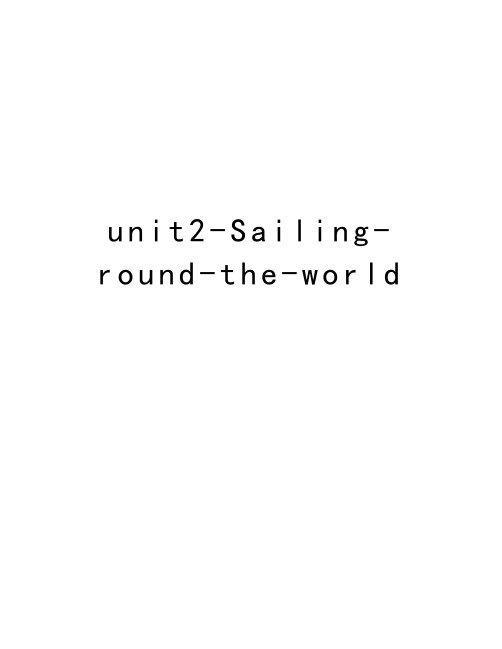
u n i t2-S a i l i n g-r o u n d-t h e-w o r l dUnit Two Sailing Round the WorldI. The Teaching Aims:After learning the story which Francis Chichester traveled round the world alone in a small yacht in spite of the fact he had lung cancer, let the students understand & learn Francis Chichester’s indomitable death-defying spirit, which he marched forward courageously.II. The Important Teaching Points:1. Consolidate the use of the “Subjunctive Mood”.2.Understanding of “ He had giv en men throughout the world new pride.”III. Teaching Strategies:Class discussions, giving instructionsIV. Time: 3 periodsV. The Teaching Procedure:Step I. Learn the new words, phrases & expressions:1. fail:(1). (vi.) be unsuccessful; become weak or exhaustede.g: - She failed in everything she tried.- He has been failing in health in the past years.(2). (vt.) unable to do sth ; disappoint; do not pass an exame.g: - Jim failed to pass the final exam.- Words failed me.- The test is easy. You simply can’t fail it.2. voyage:(1) (n.) sea journeye.g:- The letter was written on Hemingway’s voyage from the US to Paris.- The first space shuttle voyage was devoted entirely to astronomy.(2) (v.) go on a sea journeye.g: - The seaman has almost voyaged around the world.Note: The wor d “journey (n.)” usually refers to going to a distant place on the land.“Travel (n.)” is a general word which means going to a distant place, by air, sea or car.“ Trip (n.)” usually refers to a pleasure excursion as in “a honeymoontrip”, “ a weekend trip to the seaside”.3. retire: (vi.)(1) give up one’s job because of old agee.g.- Professors usually retire at 60 in China.- Next year I will retire from the school.(2) go away; withdrawe.g.-After the dinner, the ladies retired to the drawing room, leaving the men to their cigars and drinks.(3) go to bede.g.-The writer usually retires at midnight.4. damage:(1) (vt.) cause harm toe.g. -Hurricane Andrew damaged thousands of homes.- The scandal damaged his career.(2) (n.) harm: losse.g. - We must find ways to repair the damage.e.g.- The hurricane did great damage to the crops.5. contact:(1) (vt.) get in touch withe.g - Do you contact your classmates often?e.g.- As soon as the headmaster arrives, he will contact you.(2) (n.) state of touching or communicatione.g. - Many people are afraid of contacts with AAIDS patients.e.g - Robinson Crusoe was out of contact with everybody else for a long time.6. waken:(1) (vi.) stop sleepinge.g - He wakened at the first ray of daylight.(2) (vt.) wake up sb.- e.g. - The alarm bell wakened him out of a sound sleep.Step II. Learn the textA. IntroductionIntroductory Remarks:Before we study the text, I’d like to a sk you some question :(1). What is your greatest dream ?(2). Have you ever dreamed of sailing round the world?(3). If you could sail to any place in the world, where would you want to go? Why?(4). If you decided to sail round the world, what would you need to take with you the boat?Almost everyone has dreamed of travelling round the world. However, sailing round the world all by oneself is very difficult and adventurous. Many people have traveled round the world, but no one else has done it the way Sir Francis Chichester did. Let’s see a living example that the text shows us.About Sir Francis Chichester (1901-1972):Born in Devon, Britain in 1901, Sir Francis Chichester was a British adventurer. In 1931, he planned to fly round the world, but the plane was damaged in Japan. In 1960, he won the first solo transatlantic race by sailing the “Gipsy Moth II”. During 1966-1967 he sailed round the world alone in a 53-foot yacht the “Gipsy Moth IV”. He published two books “The Lonely Sea and Sky” & “ The Gipsy Moth Circles the World”The text tells us briefly what happened on him on his voyage, one of the greatest seafaring exploits of all time. To begin with the text, let’s look at a map of Chichester’s course. (Show student s the map.)B. Divide the text.This article can be divided into three parts.Part I ( Lines 1-11)The Main Idea:Sir Francis Chichester was an ambitious man. He was determined to carry out his plan to sail round the world.Language Points(1)“Francis Chichester had already surprised his friends several times.”-Why?---He was not an ordinary individual & he had tried to do sth. special. E.g: He attempted to fly round the world. Although he had failed, the whole event showed that he was different from others. His courage, ambition & behavior surprised his friends.(2) Why was Chichester determined to carry out his plan?-a. His old dream of going round the world hadn’t been realized.-b. He won the first solo transatlantic sailing race.-c. He was not you ng 7 had lung cancer, which meant that he didn’t havemuch time or chance left.Part II (Lines 12-37)The Main Idea: The process of Francis Chichester’s travelling.a. From England to Sydney.b. From Sydney to EnglandLanguage Points:(1) clipper ship: used in the China tea trade in the nineteenth century. Thegreat age of the clipper was 1845-1860. Speed was demanded in the China tea trade & also for the fast delivery of cargoes to San Francisco and Melbourne during the California and Australian gold rushes. Clippers fell out of use as freight rates declined and steam ships provided competition.(2) crew: the captain, sailors, mechanics, cooks, etc.(3) steering device: a piece of equipment for particular direction(4) What was the difference between Chichester and the great nineteenth century sailors?The sailors of the nineteenth century used big clipper ships which had had lot of crew on them. Their success was the success of a group of people. Although Chichester followed their route, he had sailed alone. His success was the success of an individual.)(5) by far: usually used to modify a superlative or comparative degree adj. or adv.e.g : -She is by far better than Jim at spelling.-He is by far the best boy in the class(6) Why did everybody say that he had done enough when he arrived in Australia?The distance he covered was twice the previous record & he had already set a new record of sailing alone. Moreover, he was very tired and weak after 107 days of voyage.(7) “… the sea became so rough that the boat almost turned over.” so…that: to/ in such a degree that ( the adv. clause of result)e.g: -Was he so angry that he hit her?-She ran so fast that we couldn’t catch up with him.(8) dissuade sb from doing sth.:prevent sb. from doing sth. by giving reasonse.g:- They dissuaded her from leaving school.- The father finally dissuaded his son from giving up the job in the factory. (9) Cape Horn: a steep headland at the south of Horn Island, Chile. It is generally considered the southernmost point of South America. All the water between South America and the Antarctic Ocean is squeezed this narrow shallow gap. Sometimes the waves there may be as high as 50 feet.(10) “Wild horses could not drag me down to Cape horn and that sinister Southern Ocean again”:---“ Wild horses could not drag” is a common metaphor used mean that nothing, no matter how strong, could make you do something.e.g: Wild horses could not have dragged me away from the exciting film. (= Nothing could have made me leave.)Ask: - What was the picture when the sea became rough?-Why did he have such a horrible feeling about that night’s experience?Part III ( Lines 38- 49)1) The Main Idea: After Chichester arrived back in England, Queen Elizabeth and the people were waiting to welcome him. The author appraised his voyage.Ask: - What had Chichester learnt himself during the voyage?- What kind of new pride had he given to men through the world?Step III. Summary Questions & Concluding Remarks:Ask: - What do you think is Chichester’s greatest achievement?- Can you sketch a map to illustrate Chichester’s sailing course?The article des cribes Francis Chichester’s experience of sailing roun d the world, as well as his courage and determination in spite of many difficulties and attempts at dissuasion to prove human perseverance. People today can certainly learn a lot from him.C. Assignments:1. Recite the words.2.Read the text fluently.3. Preview all the exercises.References:The Lonely Sea and the Sky by Sir Francis Chichester, Summersdale Publishers; New Ed edition (January 31, 2002)"Gypsy Moth" Circles the World by Sir Francis Chichester, Hodder & Stoughton Ltd (June 1, 1972)。
大学英语精读unit2 sailing round the world
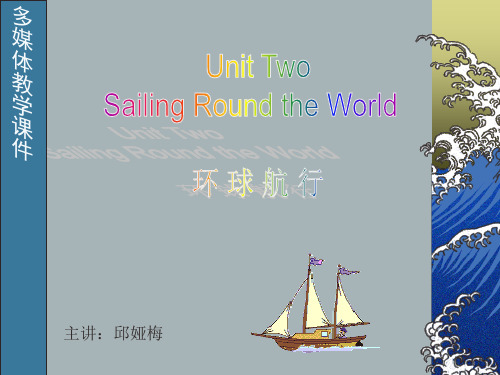
Introductory Remarks 课文介绍
几乎所有人都曾梦想过环游世界。然 而,独自一人环球航行就更为困难和 冒险。但是,弗朗西斯· 奇切斯特就做 到了,尽管他身患肺癌。 那么,这样的航行又是如何得以实现 的呢? 让我们一道来看看课文给我们展示的 这样一个鲜活的例子。
Knighthood Ceremony
Words and Expressions
16. accomplish 达到(目的),完成,实现(计划、诺言) accomplish one’s aim 达到目的 ☆ Being a famous artist, that’s what I want to accomplish. 17. conquer 征服,战胜;克服 ☆ The first thing you have to do is conquering yourself.
turn over (使)翻倒,(使)倾覆 can not help + doing sth. 禁不住做某事
☆ The story was so funny that I could not help
laughing.
这个故事太有趣了,令我忍不住笑了出来。
win,beat,defeat win赢得:win+事、物,宾语不能接人。 He soon won a reputation for himself. beat击败:beat+人,宾语只能接人,强调动
Almost everyone has dreamed of traveling round the world. However, sailing round the world all by oneself is very difficult and adventurous. But Francis Chichester could do it, even when he was suffering from lung cancer. What does such an adventure rely on? Let’s see a living example that the text shows us.
上外版大学英语精读一课文翻译Unit1-6
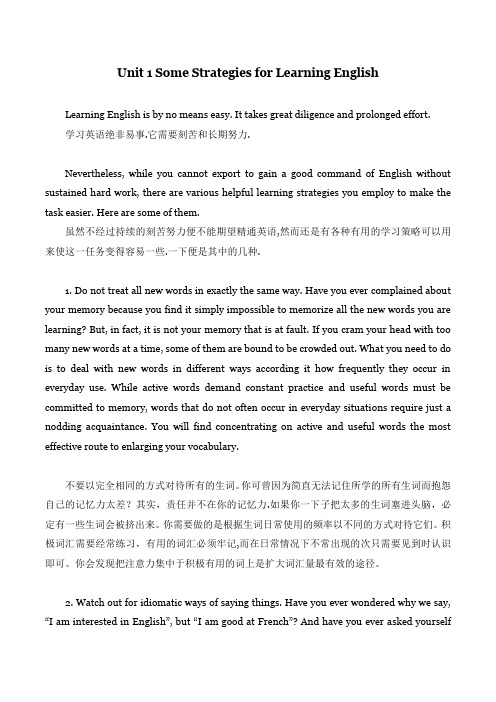
Unit 1 Some Strategies for Learning EnglishLearning English is by no means easy. It takes great diligence and prolonged effort.学习英语绝非易事.它需要刻苦和长期努力.Nevertheless, while you cannot export to gain a good command of English without sustained hard work, there are various helpful learning strategies you employ to make the task easier. Here are some of them.虽然不经过持续的刻苦努力便不能期望精通英语,然而还是有各种有用的学习策略可以用来使这一任务变得容易一些.一下便是其中的几种.1. Do not treat all new words in exactly the same way. Have you ever complained about your memory because you find it simply impossible to memorize all the new words you are learning? But, in fact, it is not your memory that is at fault. If you cram your head with too many new words at a time, some of them are bound to be crowded out. What you need to do is to deal with new words in different ways according it how frequently they occur in everyday use. While active words demand constant practice and useful words must be committed to memory, words that do not often occur in everyday situations require just a nodding acquaintance. You will find concentrating on active and useful words the most effective route to enlarging your vocabulary.不要以完全相同的方式对待所有的生词。
大学英语精读第一册unit2
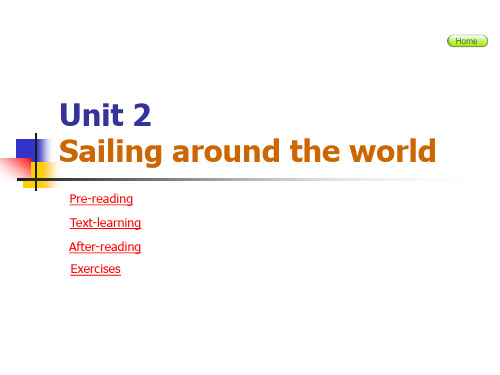
Part Division of tes
1 — 11
Main Idea
Chichester’s decision to sail round the world single-handed
2
12— 45
Chichester’s accomplishment of his great voyage
Plymouth to New York
Achievements:
In 1966-1967, he sailed around the world alone in a 55-foot sailing yacht, the longest passage made by a small sailing vessel without a port of call.
3
46 — 49
the significance of his great voyage --- giving man new pride
Multiple Choice 1. Who was Chichester? KEY A) A single-handed man. B) A British man. C) An Australian man. D) A British adventurer. 2. Before Chichester began his sailing, he was_______. KEY A) a businessman B) a pilot C) a teacher D) a doctor
3. How old was he when he decided to start his voyage round the world? A) 58. KEY B) 65. C) 66. D) 55.
大学英语精读文本1-6册

entertain
vt.
solve
vt. find an answer to (a problem) 解决(问题)
aware
a. having knowledge or understanding 知道的;意识到的
a. as much as one needs; enough 充分的;足够的
distraction
n. sth. that draws away the mind or attention 分心(或分散注意力)的事物
concentrate (on or upon)
vi. pay close attention (to) 全神贯注(于)
aside
ad. to the side 在旁边;到(向)一边
etc
(Latin, shortened form for et cetera) and other things 等等
normal
case
n. what has really happened; actual condition 实情
additional
a. added 附加的,额外的
n. addition
weekly
a. done or happening every week 每周的;一周一次的 Βιβλιοθήκη UNIT 1 TEXT
Want to know how to improve your grades without having to spend more time studying? Sounds too good to be true? Well, read on...
大学英语精读1,U2 Sailing Round the World
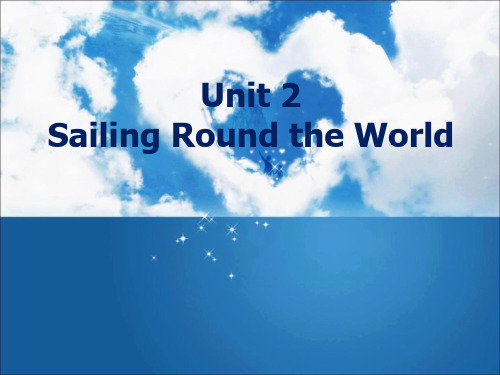
contact v. & n. 联系,接触
be in contact with eye contact 眼神交流 Please contact me by phone. 请电话联系我
following adj. 下列的,接下来的
Answer the following questions. 回答下列问题
我以前在报告中从未使用过这些词。Biblioteka dissuade v. 劝阻
词根记忆:dis(不)+suade(劝告) →劝告某人不做→劝阻 dissuade sb. from doing sth. / sth.
persuade v. 劝说,说服
persuade sb. to do sth. 说服某人做某事
cape n. 海角;斗篷,披肩
她用手遮住了脸。
previous adj. 以前的,最初的
His previous attempts were unsuccessful. 他之前的尝试没有成功 previously adv. 以前,预先 I have never used these words in any report previously.
1. Do you want to be an adventurer? If so, where do you want to go? 2. What about the idea “sailing round the world”?
Sir Francis Chichester
Sir Francis Chichester(1901 – 1972) —— English aviator,navigator and adventurer Birthplace: Devon, Britain
外教社大学英语精读1、2册课后翻译答案

外教社大学英语精读1、2册课后翻译答案第一册1:他这次考试失败使他意识到定期复习功课是多么重要。
He failed in the exam, which has made him realize the importance of reviewi ng his lessons regularly.2:请一定不要忘记离家前你父母对你说过的话。
Be sure not to forget what your parents said to you before you left home.3:我确信她的英语知识对这项工作来说是足够的。
I am sure her knowledge of English is adequate for the job.4:这篇文章的目的是告诉学生怎样培养良好的学习习惯。
The purpose of this article is to tell the students how to develop good study habit s.5:在当今时代,人们越来越多地依赖计算机来解决各种各样的难题。
In our age, people depend more and more on computers to solve various kinds of difficult problems.6:略读不仅帮助你对将要阅读的东西有所了解,还帮助你读的快些,提高你的阅读理解力。
Skimming not only helps you get some idea of what you are going to read, but als o helps you read faster and improve your comprehension.7:有些人以为男孩子考试成绩总比女孩子好,然而,事实未必如此。
Some people think that boys …performance on tests is always better than girls‟, th at is not necessarily the case, however.8:即使智力一般的学生也可以通过改进学习习惯而成为优等生。
第三版大学英语精读第一册(教桉)全

第一章教学安排的说明章节题目:Unit 1 Some Strategies for Learning English学时分配:本章六学时:一至三学时为课文讲授;四至六学时为练习和听力训练本章教学目的与要求:1. 按大纲要求使学生了解必要的文化背景知识。
2. 按大纲要求讲授单词、语法、句型等英语语言文化知识。
3. 按大纲要求提高学生英语听书读写各方面的能力。
其它:参考书目《大学英语精读第一册教师用书》、《大学英语星火学习手册》、《大学英语语法练习册》课堂教学方案课题名称:Unit 1 Some Strategies for Learning English--- Text课文讲授授课时数:三学时(Teaching Time: 3 hours)授课类型:理论课Students’ level: non-English majors of the second semester of the 1st year.教学方法与手段:讲授、讨论、指导、多媒体教学目的要求(Teaching Objectives):1、Teach the students how to study English in the college.2、Let the student share their good study habits with others.3、Make the students understand the structure pattern of an expository writing.4、About the text, Ss should grasp the text content, text structure, basic vocabularies and require grammatical points of the section.教学重点、难点:1)Words:average;case;commit;occupy;concentrate;enable;adequate;organize;double;mention;confuse; purpose; permanent2)Phrases & Expression:fill in; decide on ; be aware of; set aside; as well; look over; make useof ; go over; lead to3)Grammar:as well, so…that…;too…to …; as…as…教学内容及组织安排(Teaching Procedures):I. Pre-reading ActivitiesStep one (presentation)2.Make sure that they can pronounce each new word in the vocabulary3.Explain the important words with examplesVocabulary:average: a.ordinary; normale.g. What is the monthly income of an average family in Lanzhou?I was average in my class though I had hoped I would better? mean(平均的)e.g. The average age of the students in that class is 20.The average income of these teachers is 1000 yuan per month.n. (collocation) on (the) average: taking account over a periode.g. When he was a student in that university, he failed one subject per year onaverage.case: (multimodal word)1.actual condition, actual state of affairs.e.g. Is it the case that you fail the examination?in any case: whatever happens or may have happenede.g. in any case, I will arrive there at 8 tomorrow.In no case: in no circumstances.e.g. In no case should we give in .(predicate use inversion)in case: because of the possibility of sth. happening.e.g. Take an umbrella with you in case it (should) rain/rains.in case of: if sth. Happens e.g. In case of the rain, take a shelter.In the case of: as to e.g. In the case of my elder sister, she doesn’t like surfing the net addition: n.(1) in addition: besides. e.g. In addition, he studies French well .(2)in addition to sb./sth.e.g. When I was a middle school student I read a romantic novel inaddition to a hysterical novel every month.commit:vt.(1) decide to give (time,money,etc.) for special usage.e.g. They are committing money to offer the opportunity education ofaccepting to the poor children.(2) perform: e.g. commit suicide, errors, a crime, a mistake.(3) commit oneself to: make oneself responsible; under take.e.g. She has committed herself to give birth to a child for him. occupy: take up, fill(1)be occupied in (doing) sth.: involved or busy.e.g. He is occupied in translating the modern Chinese novel into English.(2)occupy oneself in (doing) sth: fill one’s time or keep oneself busy.e.g.The young man occupied himself in making experiments.entertain: (1)entertain sb. at/to dinner;(2) entertain sb. Withe.g. The householder/host entertain the guests with a feast/big dinner. aware:be/ become aware of :e.g.Lin fully aware of the gravity of the situation.enable: (1)enable sb. to do sth.e.g. The student’s identity cards enable the students to travel by train on halfprice.(2) enable sth.e.g.The support of the committee members enabled the passage ofthe bell.(3) “en+ noun/adjective”: change the word to be verb , meaning ”e.g . en+large=enlarge(to make large) en+rich=enrich( to make rich) adequate: (1) as much as one needs:a. suggesting the amount is satisfactorye.g. There hundred yuan per month is not adequate to support a family ofthree in a city.b. enough:(of quality) as great as is needed. It is the most general term.e.g. Live got enough of you.(too much complaint)c. sufficient: enough, written language.(literary language)e.g. Toby’s father has saved sufficient money to support his college study.(2)suitable ; fit collocation: be adequate to (doing) sth.e.g. Do you think he is adequate to (accomplishing) the task? concentrate(on/upon):vi. pay close attention tovt. come or bring together at one place.e.g. concentrate all the forces.content: what is written in a book, etc.e.g. The contents of the book is printed in bold typeportion:a portion of …, (a series of, a species of)e.g. A large portion of his articles was published.A large number of his articles were published.mention: (1) vt. Speak or write about sth. In a few words.e.g.Do not mention to his wife that he started smoking again.(2) n. referring toe.g. At the mention of the headmaster, the pupil’s heart sank.(3) not to mention + v.inge.g.He can not walk, not to mention running.confused: adj. Be confused about.e.g. Lin confused about the difference between these expressions.attitude:(1) What are thinks about sth. or sb.attitude towards/to/aboutattitude of sb.e.g. What’s your attitude to/about/toward women’s rights?attitude towards the studentsattitude of the students(2) pose, man ner of hiding one’s body.e.g. He stood there in a menacing attitude.课堂练习或讨论、布置作业:1. T asks Ss to come out the main idea, structure of the text (10mins)2. T summarizes the main idea and structure of the text (5 mins)课堂教学方案课题名称:Unit 1 Some Strategies for Learning English--- listening & Practice听力及练习授课时数:三学时(Teaching Time: 3 hours)授课类型:理论课Students’ level: non-English majors of the second semester of the 1st year.教学方法与手段:讲授、讨论、指导、多媒体教学目的要求(Teaching Objectives):1、Teach the students how to study English in the college.2、Let the student share their good study habits with others.3、Make the students understand the structure pattern of an expository writing.4、About the text, Ss should grasp the text content, text structure, basic vocabularies and require grammatical points of the section.教学重点、难点:1)Words:average;case;commit;occupy;concentrate;enable;adequate;organize;double;mention;confuse; purpose; permanent2)Phrases & Expression:fill in; decide on ; be aware of; set aside; as well; look over; make useof ; go over; lead to3)Grammar:as well, so…that…; t oo…to …; as…as…教学内容及组织安排(Teaching Procedures):II. While-reading Activities1. Ss have the silent reading on the text (10 mins)2. Let the students read the questions after the text first. Then explain the text to thestudents. The following are the difficult sentences:a.sounds too good to be true.(Introduction)b.This is not necessarily the case, however.(L.3)c.Yes, even students of average intelligence can be top students withoutadditional work.d.Fill in committed time such as eating, sleeping, meetings, classes,etc.(L.6-7)e.Skimming helps double your reading speed and improve youcomprehension as well.f.Review important points mentioned in class as well as points you remainconfused about.After that, let the students answer those questions.3. Teacher asks Ss to come out the main idea, the structural organization of the text. (10 mins)4. Teacher summarizes the main idea, the structures of the Section A. (5 mins)The structure of the text:a.introduction (para.1)b.Body (Para.2-7)c.Conclusion (para.8)III. Post-reading Activities1. Let the students do the exercises in the text-book that are related to the new words.2. Ss hand in the summary of the text.3. Ss discuss the questions on the topic related to the text.✓Do you have any other effective study habits or techniques?✓Divide the class into small groups. Each group is about 5-6 students.✓In the group, one will be appointed group leader, another secretary and a third oral reporter.4. Let the students do the other exercises in the test book and check the answers together under the instruction of the teacher.课堂练习或讨论、布置作业:Writing第二章教学安排的说明章节题目:Unit 2 Sailing Round the World学时分配:本章六学时:一至三学时为课文讲授;四至六学时为练习和听力训练本章教学目的与要求:1. 按大纲要求使学生了解必要的文化背景知识。
第三版大学英语精读1Unit 2

中南财经政法大学武汉学院外语系《大学英语1》(专科)课程教案Teaching Plan for College English (Book 1) Foreign Languages Department of Wuhan College, ZNUEL任课教师签名:Lecture NotesBefore Reading:Introductory RemarksA British adventurer, Francis Chichester traveled round the world alone in a small boat called the “Gipsy Moth IV” in spite of the fact that he had lung cancer. This text tells us briefly what happened to him on his voyage. To begin with, let’s draw a map of Chiceester’s course.Warming-up1. DiscussionTeacher: Before we study the text, let me ask you some questions.1) Do you like traveling? Do you like traveling alone?2) What do you think is the most important for a person who suffer from lung?2. Questions about the TextBased on the title, guess what the text is about.Question: Who sailed round the world, and how?3. Information Related to the Text1) Sir Francis ChichesterBorn in Devon, Britain, in 1901, Sir Francis Chichester later became a British adventurer. As a young man, he went to New Zealand, where he worked as a miner, salesman and land agent.After returning to England in 1929, he made a solo flight to Australia in a biplane. Two years later, in 1931, he piloted the first east-west flight over the Tasman Sea between New Zealand and Australia. He then planned to fly around the world, but the plane was severely damaged in an accident in Japan.After World War II he founded a business in London. Taking up ocean sailing in 1953, he won the first solo transatlantic race in 1960 by sailing the “Gipsy Moth IV” from Plymouth to New York City in 40 days.2) Knights and KnighthoodKnights were the highest class of fighting men in Europe during the Middle Ages. There were other classes of fighting men, such as the lowly foot soldiers. But the knights, who fought on horseback, were the aristocrats of the battlefield. The great heroes of the time, both in story and in fact, were knights.By the year 1,500 the time of the knight as fighting man was over. But knighthood did not die out altogether. Today in Great Britain, knighthood is an honorary award given to outstanding people in recognition of some remarkable work they have done. A man with the rank of knight is called “Sir” (prefixed to his whole name or given name, but not to his surname alone), an d his wife “Lady”. A woman with the same rank is called “Dame”.When a person is being honored, the King or Queen usually takes his or her sword or borrows one from someone present at the ceremony. The person about to be knighted kneels on one knee and bows his head respectfully in front of the King or Queen. The King or Queen touches with the sword first the left shoulder of the person bowing before him or her then the right shoulder and finally the top of the bowed head. While doing this the King or Queen says, “We dub thee Sir _____.”3) Sir Francis Drake (1540 – 1596)English naval explorer, once the vice-admiral of the British Navy. After several slave-trading expeditions to West Africa and the Spanish Main (1566 – 1573), he sailed round the globe in the Golden Hind (1577 – 1580). He managed to tie down the Spanish Armada by raiding Cadiz (1587), and helped defeat the Spanish attempt to invade England (1588). To historians, he is controversial figure. The British regard him as a national hero while many in other countries think of him as a pirate.Global ReadingComprehension of the Text1. Multiple Choice1) Who was Chichester? (Key: D)A) A single-handed man.B) A British man.C) An Australian man.D) A British adventurer.2) Before Chichester began his sailing, he was _______. (Key: B)A) a businessmanB) a pilotC) a teacherD) a doctor3) How old was he when he decided to start his voyage round the world? (Key: B)A) 58.B) 65.C) 66.D) 55.4) What do you know about his boat? (Key: C)A) Its name was Gipsy.B) It was 60 meters long.C) Its name was Gipsy Moth.D) It was 16 meters wide.2. Answer the following questions based on the text:1) What happened to Francis Chichester in 1931?2) How old was he when he started his voyage round the world?3) What was the name of his boat? What was the length of the boat?4) What route did Chichester follow in sailing around the world?5) How many miles did he cover on the first half of his voyage?6) What did his friends in Sydney try to dissuade him from doing?7) In what way was the second half of his voyage the more dangerous part?8) What happened to Chichester on the night of January 30?9) How did Chichester feel after sailing round Cape Horn?10) How was he received when he arrived back in England?11) What title is added to his name when a man becomes a knight?12) How many miles did the second half of the voyage cover?Text Organization1. What type is the text?A. narrationB. expositionC. descriptionD. argumentationKey (A)Words &Expressions1. set out: i. begin a journeyii. begin a course of actionAt sixty-five Francis Chichester set out to sail single-handed round the world.2. single-handed: adj. & adv. 单独的(地)The job cannot be done single-handed.She accomplished the task by her single-handed efforts.Para. 21. give up: stop doing or having (something)一位老者在公共汽车上把座位让给一位抱着孩子的妇女。
- 1、下载文档前请自行甄别文档内容的完整性,平台不提供额外的编辑、内容补充、找答案等附加服务。
- 2、"仅部分预览"的文档,不可在线预览部分如存在完整性等问题,可反馈申请退款(可完整预览的文档不适用该条件!)。
- 3、如文档侵犯您的权益,请联系客服反馈,我们会尽快为您处理(人工客服工作时间:9:00-18:30)。
turn over (使)翻倒,(使)倾覆 can not help + doing sth. 禁不住做某事
☆ The story was so funny that I could not help
laughing.
这个故事太有趣了,令我忍不住笑了出来。
win,beat,defeat win赢得:win+事、物,宾语不能接人。 He soon won a reputation for himself. beat击败:beat+人,宾语只能接人,强调动
作。
The problem beats me. defeat打败,胜过:defeat+人,只能接人为
宾语,强调结果。
The Americans defeated the British at Yorktown,Virginia in 1781.
Phrases Review 词组回顾
环球航行/飞行 sail round the world
☆ They kept going in spite of their fears.
Phrases and Expressions
by far to … 的多 * 用于修饰形容词或副词的比较级或最高级
☆ She is by far brighter than her brother.
☆ By far the best way to contact her is to send E-mail.
在…比赛中夺魁
宿愿重现
win the…race
old dream of…come back
决意去做
全靠自己
be determined to…
all by oneself
受到热烈欢迎
置若罔闻
receive a warm welcome from
will not listen Wild horses could not
Words and Expressions
13. contact vt.&n. 联系,交往,接触 be in contact with sb./sth. 与某人(某物)接触,联系 contact lens 隐形眼镜 ☆ Do you contact your old classmates often? 14. nearby adj. 附近的
Words and Expressions
16. accomplish 达到(目的),完成,实现(计划、诺言) accomplish one’s aim 达到目的 ☆ Being a famous artist, that’s what I want to accomplish. 17. conquer 征服,战胜;克服 ☆ The first thing you have to do is conquering yourself.
10th July 1967 Sir Francis Chichester receives his Accolade of Knighthood from the Queen at a ceremony at Greenwich, recalling another ceremony, nearly four hundred years ago, at Deptford, when Sir Frances Drake was Knighted using the same sword
☆ Professor usually retire at 60 in china.
☆ Michael Jordan retired from NBA Games in 2000.
Words and Expressions
5. voyage 航海,航行,旅行 make a voyage across the Atlantic 作横跨大西洋旅行 * voyage 指海上、水上的航行,也指太空旅行 travel 泛指旅行、出行 tour 强调旅游、观光,并返回出发地的旅行 6. crew 全体船员、全体乘务人员 ☆ The crew on plane were all dead in the air crash. 7. damage vt.& n. 毁坏,损坏 ☆ Typhoon damaged thousands of homes this year. Typhoon did great damage to the crops. 8. cover 盖住,覆盖;行过(一段路) ☆ The travelers covered 400 miles a day by car.
Words and Expressions
1. single-handed 单独的 ☆ The job cannot be done single-handed. 2. adventure n.奇遇,冒险;指探险活动 venture n. 冒险,风险;主要是经商、投资等活动的风险 ☆ Every journey outside the house is an adventure to the baby. 3. determine vt. 决定,使下决心 determine to do sth. determined adj. 下定决心的,坚决 be determined to do sth. determination 决心 determine on / upon doing sth. 决定做某事,对某事下决心 ☆ He determined to have postgraduate study after graduation. 4. retire 退休,退役;退下,退出
Introductory Remarks 课文介绍
几乎所有人都曾梦想过环游世界。然 而,独自一人环球航行就更为困难和 冒险。但是,弗朗西斯· 奇切斯特就做 到了,尽管他身患肺癌。 那么,这样的航行又是如何得以实现 的呢? 让我们一道来看看课文给我们展示的 这样一个鲜活的例子。
Knighthood Ceremony
指空间时,用nearby作定语
* near adj. 附近的,近来的 可指时间、空间, the near future near by adv. 在附近 作状语 ☆ Yingtian Temple sits on a hill near by. 15. waken 醒来;唤醒 ☆ He wakened at the first ray of daylight. ☆ The alarm bell wakened me from dream.
即使是野马也无法
Phrases Review 词组回顾
经历恐惧 experience fear
众口一词
醒来
Everybody says the same thing
wake up
假如发生意外
取得成功 发消息 在现代 依靠 全世界
if anything should happen
Phrases and Expressions
set out 从某地出发;开始作某事 set off 出发, 启程
☆ He sets out to set a new world record.
give up
放弃
☆ He is not a man who gives up easily.
(all) by oneself 独立地,单独地 in spite of 尽管,不顾 班 跟名词或动名词
The king or Queen takes the sword of the person being honored or borrows one from someone present at the ceremony. The person about to be knighted kneels on one knee and bows his head respectfully in front of the King or Queen. The King or Queen touches with the sword first the left shoulder of the person bowing before him or her then the right shoulder and finally the top of the bowed head. While doing this the King or Queen says "We dub thee Sir_______."
Almost everyone has dreamed of traveling round the world. However, sailing round the world all by oneself is very difficult and adventurous. But Francis Chichester could do it, even when he was suffering from lung cancer. What does such an adventure rely on? Let’s see a living example that the text shows us.
你要做的第一件事就是战胜你自己。.
18. undoubtedly 无疑,必定的 un(不、无) + doubted(怀疑的)+ ly = undoubtedly = no doubt = without doubt ☆ Bill Gates is undoubtedly the richest man in the world. 19. moreover adv. 而且,再者 = furthermore what’s more besides
succeed in send a message to in the modern age depend on throughout the world
